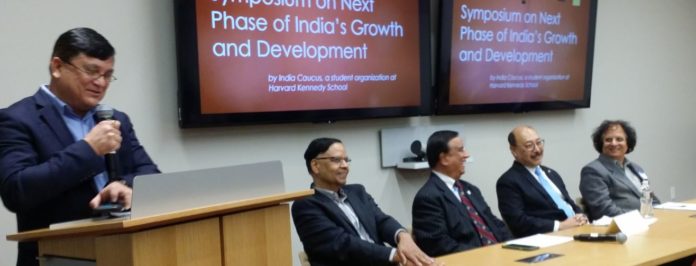By Geetha Patil
CAMBRUDGE, MA-A day-long symposium titled, ‘Next Phase of India’s Growth and Development’ and organized by the India-Caucus at Harvard Kennedy School in Cambridge, MA was held on Friday.
Distinguished panel members, keynote speakers presented their views and research findings about the current state and the future of India in various fields. Special keynote speaker Hon. Ambassador Harsh V. Shringla concluded the event by providing a brief description of the approaches and policies that are going to support India in realizing its bright future and dreams with utmost confidence.
Symposium started with the welcome session, in which Ms. Diksha Bijlani from the India Caucus HKS delivered her opening remarks saying that the main objective of this symposium is to understand the current state of India and the issues and the concerns that are coming in its development.
Balram Singh, Chairman, Boston Center of Excellence for Health and Human Development said that although India is moving in its right direction with many challenges on its plate but this symposium will throw light on the factual issues in various fields and helps the policy makes to take the right approaches. The Special Guest of this session, Mr. Nam Pham, Assistant Secretary for Business Development & International Trade, Commonwealth of MA mentioned that relationships between India and Massachusetts are special and unique in many areas and people here want to work with and support India in its development.
The keynote speaker, Hon. Sandeep Chakravorty, Consul General of India from New York spoke on how India is emerging as a leading power in Asia and the world.
Panel members of the first session talked about the current state and future of health care in India. The panelist, Mr. Vivek Sharma from the Decision Resources Group spoke on the topic, “Indian Health Care Landscapes: Complex Yet Promising.” He also touched upon the complexities of health care market and how the government policies and actions are helping the common man to receive the benefits of health care in spite of the gap between what to pay and what gets paid.
Prof. Ravi Ramamurti, Northeastern University talked about “Healthcare Exemplars from India.” He gave examples of many hospitals in India that are providing best health care services at a reasonable rates in the midst of challenges. He described diligently the lessons that need to be learned from these exemplar hospitals for our nation’s future expansion of health care services.
Prof. Satchit Siddharth Balsari, Harvard Medical School spoke on the topic, “Small Data: When Big is Not Better.” He talked about a blueprint for India’s digital health system and various regulatory standards for health data protection and right to portable data in a machine readable format.
Prof. Fatema Basrai, Yale School of Public Health talked about “Sustainable Health Initiative (SHI): Building Healthcare Innovation in India” highlighting how SHI selects startups based on their potential to improve health care in Indian and the rest of the world. Dr. Ruha Shadab, Public Service Fellow, HKS presented her observation & comments on the health care system in India and the US. Mr. Kanchan Banerjee, Director Indo-US Health Initiatives, moderated the session with Q&A part very professionally.
Second session after the lunch focused on Indian Economy Today and Tomorrow which started with the key note address by Prof. Arvind Panagariya, Columbia University on “India’s Growth Slowdown: Diagnosis and Prognosis.” He talked about the growth and the fall of GDP over the years and mentioned his analysis of the factors that are affecting its growth temporarily and many reforms that are going to help GDP’s growth in future. Later, Prof. Nidhiya Menon, Brandeis University spoke on the topic, “Some Areas for Further Attention in Tomorrow’s India.”
She draw the attention of the audiences towards the air and water pollution, child and maternal health, and women’s participation in the situation of lack of productive jobs and suggested some useful measure to consider to reach desired economic growth and development. Prof. Pravin Krishna, Johns Hopkins University talked on the topic, “Trade and Structural Transformation.” He emphasized India’s present bilateral agreement trade shares, and GVC share and suggested that there is a need for reformation. Moderator Prof. Devashish Mitra, Syracuse University did a wonderful job by summing up the session and handling interesting questions by the audiences to the speakers.
Session 3 concentrated on India and the World. Prof. Manjari Chatterjee Miller, Boston University presented her observations on “India, China, and PostColonial Worldviews.” Mr. Kunal Singh, MIT described “India’s Evolving Bilateral and Security Partnerships.” As a moderator, Mr. Dhruv Jaishankar from the Observer Research Foundation handled the session very skillfully and handled cleverly Q&A episode and concluded the session with his brilliant remarks.
Concluding Session started with remarks by the special guest, Mr. KV Kumar, President and CEO, Indian American International Chamber of Commerce (IAICC) who summarized the proceedings of the symposium and welcomed the Hon. Ambassador Harsh V. Shringla for his key note address. Hon. Ambassador described with great details various government programs, policies, and action plans that are running with India’s growth and development as their main agenda. Mr. Kanchan Banerjee thanked all the audiences for their active participation and the organizers, supporters, and the volunteers for their services.
This symposium was supported by the Boston Center of Excellence for Health and Human Development Consulate General of India, New York, Observer Research Foundation. Mass India Partnerships, Indian American International Chamber of Commerce, Global Indians for Bharat Vikas and Milan USA.















